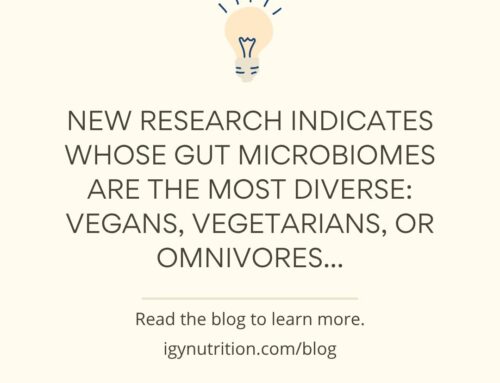Got a family member or friend with gut health issues? We’ve got you covered.
We’ve separated the gift ideas into three categories:
- Tools
- Tests and Healthcare Professionals
- Supplements
Read on for a long list of ideas for gut health supplements for dysbiosis.
Recap on Dysbiosis
The microbiome is an ecosystem of millions of microbes – bacteria, yeasts, even fungi – living within or on the human body. The term “gut microbiome” refers to the microbes inhabiting the GI tract (1).
At first glance, microbes living in the body might sound pretty gross, but they’re necessary for our survival (1)!
Many of the microorganisms living within us benefit our bodies by regulating metabolism, helping us absorb vitamins from food, supporting our immune system, and much more (1).
The thing is, not all of the microorganisms in our microbiomes are helpful. Some are harmful. These harmful microbes can damage the gut barrier, increase inflammation, and wreak havoc on our metabolisms, hormones, immune systems, and even our mental health (1).
Plus, they can cause uncomfortable digestive issues like gas, bloating, and stool irregularity – no fun.
Ideally, we would minimize the gut damage and annoying symptoms that harmful microbes cause and maximize the benefits helpful microbes confer. To do that, we want lots of beneficial microbes and very few harmful microbes to live in our guts (1, 2).
The objective is straightforward: 1) maximize helpful microbes, 2) minimize harmful microbes, and 3) maintain this balance throughout life (2).
Certain supplements can help ensure that’s the case (and therefore make excellent gut health gifts). Let’s take a look.
Pre and Probiotics
It’s no secret that prebiotics and probiotics are flying off the shelves. So what exactly do they accomplish – and do they make a valuable gift?
Pre and probiotics’ popularity is valid: they support the helpful bugs living in the microbiome (3, 4).
Prebiotics feed helpful microbes. Think of prebiotics as fuel for the good bugs. Prebiotics can be found in foods, but they can also come in supplement form (3).
Probiotics are helpful microbes – they are good gut bugs. Once consumed, they’re deployed to the microbiome battlefield and work to secure beneficial-bug dominance. While in the GI tract, they also confer benefits like vitamin absorption and immune response (4).
When purchasing a probiotic, look for independently lab-tested brands for quality. Often, unverified probiotics are already dead once they hit the shelves.
You’ll also want to make sure the probiotic contains a variety of strains. The label will list how many strains the probiotic contains – the more, the merrier.
You may buy prebiotics in pill or capsule form, but powdered prebiotics may pack more of a punch. Psyllium husk has a neutral taste and is one of the most potent prebiotics available. It blends into smoothies nicely.
Pre and probiotics sound pretty great, right? Fuel and good-guy microbes in a bottle to help your friend or family member overcome dysbiosis?
You’re right, pre and probiotics are pretty great, and they help millions of people with their gut health per day. But they’re not necessarily a cure-all for dysbiosis.
To overcome dysbiosis, you’ve got to bolster your helpful microbes with pre and probiotics – but you’ve also got to weaken the harmful microbes. We can help Batman all we want, but he still has to kill the Joker at the end of the day.
Check out our blog titled “Pre and Probiotics, IgY Max, or Both” to learn more about why pre and probiotics fall short on their own.
So if we can’t overrule the harmful microbes solely by supporting the helpful microbes, how do we address them?
That’s where IgY Nutrition comes in: antibodies.
Antibodies
Wouldn’t it be great if you could pop a pill that would kill the harmful microbes living in the microbiome?
That way, the beneficial microbes could take over, dominate, reproduce, and confer as many benefits as possible. Probiotics would also have room to integrate permanently – they’d take up the space the harmful ones used to occupy.
You might think – wait, isn’t that what antibiotics do? Clear out the bad guys?
Antibiotics do kill harmful microbes, though they’re usually not so effective at achieving remission. In some cases, they’re only effective 50% of the time (5,6)!
The catch is that antibiotics also kill helpful microbes. Antibiotics often cause dysbiosis in the first place due to this reduction of beneficial microbes.
Antibiotics kill off most of the harmful (and helpful) microbes in the gut, leaving only the strongest harmful ones to reproduce and dominate. This imbalance puts you and your microbiome in a precarious position: crossing your fingers and hoping that the helpful survivors prevail.
So nope – antibiotics are not miracle pills that only kill harmful microbes.
IgY antibodies, on the other hand, could be.
IgY antibodies, found in IgY Max, are targeted to kill 29 of the most common dysbiotic microbes living in the gut microbiome.
Unlike antibiotics, they only kill the bad guys.
As they move through the GI tract, IgY Max antibodies kill any of the 29 harmful microbes they encounter. Removing these microbes creates room for the beneficial microbes to reproduce and outnumber the harmful microbes, thereby rebalancing the microbiome. Mission accomplished.
If you’re interested in purchasing antibodies for your friend or family member, head to Amazon and type in “IgY Max.” For only $50, it makes a killer gut health gift!
Thanks for joining us today. Happy holidays and good luck on your gut health journey!
References
- https://www.sciencedirect.com/topics/medicine-and-dentistry/gut-microbiome
- Belizário JE, Faintuch J. Microbiome and Gut Dysbiosis. Exp Suppl. 2018;109:459-476. doi: 10.1007/978-3-319-74932-7_13. PMID: 30535609. https://pubmed.ncbi.nlm.nih.gov/30535609/
- https://www.sciencedirect.com/topics/agricultural-and-biological-sciences/prebiotics
- https://www.sciencedirect.com/topics/immunology-and-microbiology/probiotic#:~:text=Probiotics%20are%20defined%20as%20nonpathogenic,when%20administered%20in%20adequate%20amounts.
- Majewski M, Reddymasu SC, Sostarich S, Foran P, McCallum RW. Efficacy of rifaximin, a nonabsorbed oral antibiotic, in the treatment of small intestinal bacterial overgrowth. Am J Med Sci. 2007 May;333(5):266-70. doi: 10.1097/MAJ.0b013e3180536784. PMID: 17505166. https://pubmed.ncbi.nlm.nih.gov/17505166/#:~:text=Conclusions%3A%20Rifaximin%20in%20a%20dose,in%20approximately%2050%25%20of%20patients.
- Ramirez, Jaime et al. “Antibiotics as Major Disruptors of Gut Microbiota.” Frontiers in cellular and infection microbiology vol. 10 572912. 24 Nov. 2020, doi:10.3389/fcimb.2020.572912 https://pubmed.ncbi.nlm.nih.gov/17505166/#:~:text=Conclusions%3A%20Rifaximin%20in%20a%20dose,in%20approximately%2050%25%20of%20patients.




